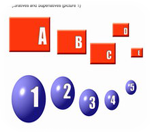Login form
Free Download
![]() Download miễn phí tài liệu học TOEIC, TOEFL iBT, IELTS, từ vựng, ngữ pháp, phát âm,...Hãy đăng ký thành viên hoặc đăng nhập để bắt đầu!
Download miễn phí tài liệu học TOEIC, TOEFL iBT, IELTS, từ vựng, ngữ pháp, phát âm,...Hãy đăng ký thành viên hoặc đăng nhập để bắt đầu!




![]() Download miễn phí tài liệu học TOEIC, TOEFL iBT, IELTS, từ vựng, ngữ pháp, phát âm,...Hãy đăng ký thành viên hoặc đăng nhập để bắt đầu!
Download miễn phí tài liệu học TOEIC, TOEFL iBT, IELTS, từ vựng, ngữ pháp, phát âm,...Hãy đăng ký thành viên hoặc đăng nhập để bắt đầu!
 1.How's the weather in your country?
1.How's the weather in your country?
The summer is much hotter than here, and the winter is also much colder. The best time is spring, it's beautiful!
-----
2. Which restaurant do you like?
Bella Rosa is good, they've got good food but it's expensive. McDonalds is cheaper, but it's really unhealthy. I think the Vietnamese restaurant is the best, it's the cheapest, the healthiest, and the most delicious!
-----
3.
How's your English going?
Oh, it's much better these days. It's easier than before, and I know more words and I can speak more confidently. It's great.
I'm really glad to hear it. Keep up the great work!
--------
Key Vocabulary
|
weather |
cheapest |
Grammar
Comparatives and Superlatives
Comparatives show more or less of a particular attribute, they compare things. Comparatives are generally used for comparing two things, and superlatives are used for comparing three or more things.
If it's clear what we are comparing to, then we can just use the comparative form on its own. For example:
- I am faster.
- She is older.
Otherwise we use than before the thing we are comparing to. For example:
I am faster than John.
She is taller than me.
Superlative forms don't use than and are always preceded by the definite article the. For example:
- I am the tallest student in my school.
Comparatives
-----
One-Syllable Adjectives
To make a comparative from an adjective with one syllable, we add -er to the adjective, for example:
- slow - slower
- fast - faster
- tall - taller
- short - shorter
To make a comparative from a one syllable adjective ending in -e, we just add -r. For example:
- nice - nicer
- large - larger
If the one syllable adjective ends in a vowel and a consonant, we double the consonant. For example:
- big - bigger
- hot - hotter
- thin - thinner
Two-Syllable Adjectives
If the adjective has two or more syllables, we add more before the adjective.
For example:
This book is more expensive than that book.
This picture is more beautiful.
However there are many exceptions to this one/two-sylllable rule.
Some two-syllable words behave like one-syllable ones: For example:
This is easier - Correct
This is more easy - Incorrect.
This is simpler - Correct
This is more simple - Incorrect
And some adjectives can use both comparatives forms: For example
- clever - cleverer - more clever: These are all correct.
- quiet - quieter - more quiet: These are all correct.
Exceptions cannot be learnt through rules, the best way to learn them is simply to pick them up case by case.
Superlatives
-----
One-Syllable Adjectives
To make a superlative from an adjective with one syllable, we add -est to the adjective, for example:
- slow - slowest
- fast - fastest
- tall - tallestr
- short - shortest
To make a superlative from a one syllable adjective ending in -e, we just add -st. For example:
- nice - nicest
- large - largest
If the one syllable adjective ends in a vowel and a consonant, we double the consonant. For example:
- big - biggest
- hot - hottest
- thin - thinnest
Two-Syllable Adjectives
If the adjective has two or more syllables, we add most before the adjective.
For example:
This book is the most expensive book.
This picture is the most beautiful picture in the museum.
Irregular Forms
There are a few irregular forms. Below gives the adjective, comparative, and superlative forms.
good - better - best
bad - worse - worst
far - farther - farthest
far - further - furthest
little - less - least
much/many - more - most
For example:
You are the best student in the world!
I am far from home, he is further from home, but he is the furthest from home.
-----
As usual, what looks complicated in a list of rules will become simpler with practice and experience. Good luck!